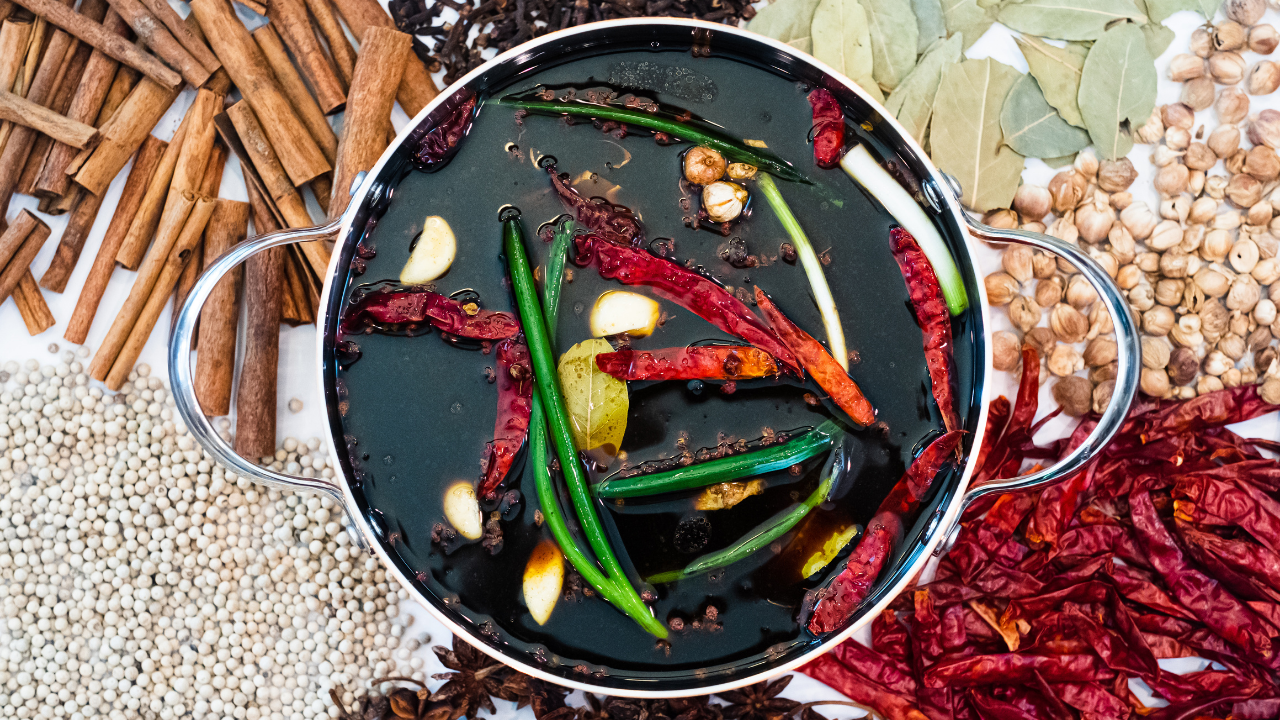Chinese Master Brine Sauce (Lushui 卤水)
Rated 5.0 stars by 1 users
Author:
Souped Up Recipes
Chinese Master Brine (Lushui 卤水) is a savory and aromatic brine that is infused with abundant Chinese spices and aromatics, seasoned with soy sauce, salt, sugar, rice wine, and other seasonings. It can last 100s of years if you take care of it correctly, I will explain that later. It is used to poach or braise meat and tofu, to soak eggs and vegetables. The dish that is cooked in the Lushui, we call it Luwei (卤味), is one of the most popular foods in the South of China. Sadly, it is not well known in the western world. That’s why I want to talk about it to bring a bit of awareness and hopefully, you will fall in love with it. Every family has its own version of Lushui. This is my recipe.

Ingredients
-
2 slices of sand ginger
-
1 small cinnamon stick
-
1 piece of gardenia pod, optional
-
2 cloves
-
1 tsp of white peppercorns
-
1 tsp of fennel seeds
-
3 tbsp of Sichuan peppercorn
-
½ cup of red dried chilies
-
2 inches of ginger, sliced thinly
-
5 cloves of garlic
-
2 scallions
-
5-6 cups of bottled water or distilled water
-
6 tbsp of soy sauce
-
3 tbsp of dark soy sauce, for the color
-
¼ cup of Chinese cooking wine
-
¼ cup of rock sugar
-
1 tbsp of salt
Directions
HOW TO MAKE THE CHINESE MASTER SAUCE
Add oil to a large pot. Add all the spices along with the ginger slices, garlic cloves, and scallions. Stir over medium heat for a couple of minutes or until fragrant.
Add 5-6 cups of bottled water or distilled water then bring to a boil. Do not use tap water as it will ruin the quality of your Lushui (卤水).
Add soy sauce, dark soy sauce, Chinese cooking wine, rock sugar, and salt. Chinese master sauce supposed to be a lot saltier than your normal taste so it can infuse its flavor into the ingredients you want to cook in it.
Simmer for 15 minutes and your Lushui is ready to be used as poaching or braising liquid.
HOW TO STORE CHINESE MASTER SAUCE
After you are done cooking, strain the braising liquid to remove all the solid ingredients. Bring the broth back to a full boil.
Store it in a clean mason jar. Put it in the fridge. Once it cools down. There will be a layer of fat formed on the top. Scoop it out. Some people suggest keeping the fat for more flavor. Some think the fat makes your Lushui spoil faster. I prefer to remove it but I will keep the fat for other cooking use.
Freeze the Lushui for up to 2 months. Ideally, reuse this brine at least once every 2 months to develop the flavor.
HOW TO RE-USE CHINESE MASTER SAUCE
Next time you want to make Luwei again, you just do the same thing. Stir fry some aromatic first. The difference is that you don’t use plain water, instead, you will pour in the flavorful brine that you made previously. Depending on the evaporation, you do have to add some water once in a while and make sure to add more spices, sugar, soy sauce, and other seasonings to keep it from diluting. This is the trickiest part because I know you will ask me how much more ingredients should I add? Well, for the spices and aromatics, you can use the same amount. But for the sugar, soy sauce, and other seasonings, it is to taste because it depends on how much meat you are braising and how much water you are adding in. So i can’t give you an exact number.
If you don’t have any plans to reuse the brine, you still need to take it out of the freezer every 2 months. Defrost it and bring it back to a full boil to kill any microorganisms in the stock. Store it in the mason jar and freeze it again. This way, it will renew it is storage time for 2 more months. It is better to label it so you don’t forget. In theory, your master brine could be sustained indefinitely if due care is taken to ensure it does not spoil. If you missed the schedule by accident, you have to discard the brine and start new again.
































































